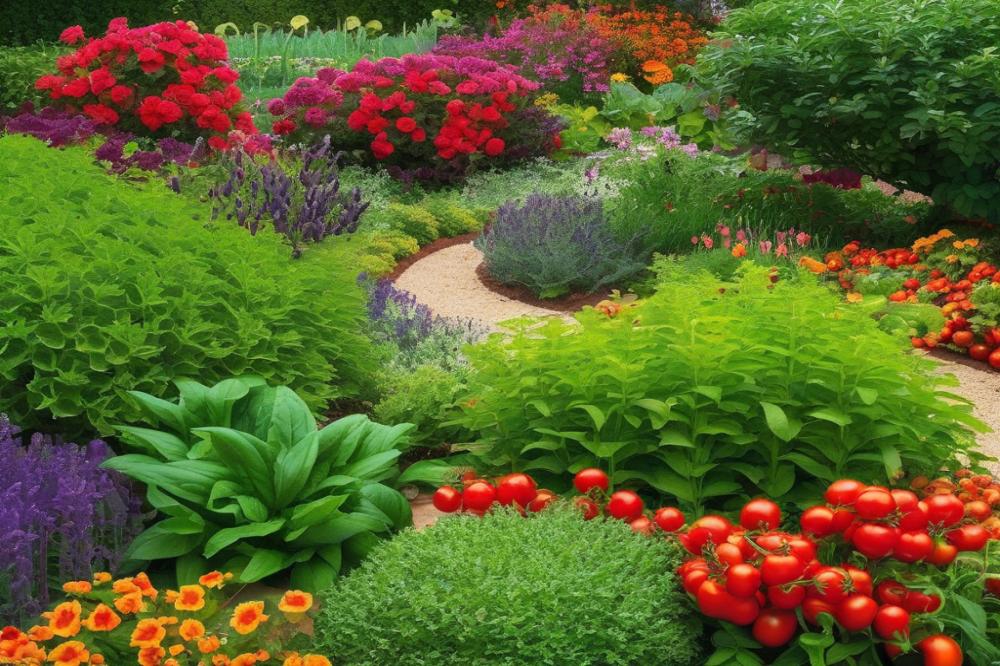Understanding the Impact of Ant Colonies on garden beds
Ant colonies can play a significant role in the garden ecosystem. They work tirelessly underground, aerating the soil and helping with decomposition. Healthy soil promotes better plant growth, which can be beneficial for your gardening efforts. However, their presence isn’t always positive. Some ants can become pests, especially when they protect harmful insects like aphids that damage plants.
Effective ant control is essential for any gardener. Without proper management, these colonies can disrupt soil health and harm plant protection. Understanding ant behavior aids in the decision-making process. Recognizing when they are friend or foe is key. For instance, while they help with soil aeration, their tendency to foster harmful pests can lead to trouble.
Managing ant colonies is crucial for gardening success. You want plants to thrive, but ants can create challenges. Organic pest management strategies help maintain a healthy balance in the garden. Utilizing natural remedies not only reduces ant populations but also protects beneficial insects that contribute to plant health.
Pest prevention should be part of your regular garden maintenance. If you notice an ant problem, taking action early is important. Implementing gardening tips that include barriers or deterrents can keep ants in check. It’s about finding a harmonious relationship with these insects while ensuring that your plants flourish. Awareness of how to interact with these small creatures goes a long way in building a successful garden.
Understanding Ant Behavior
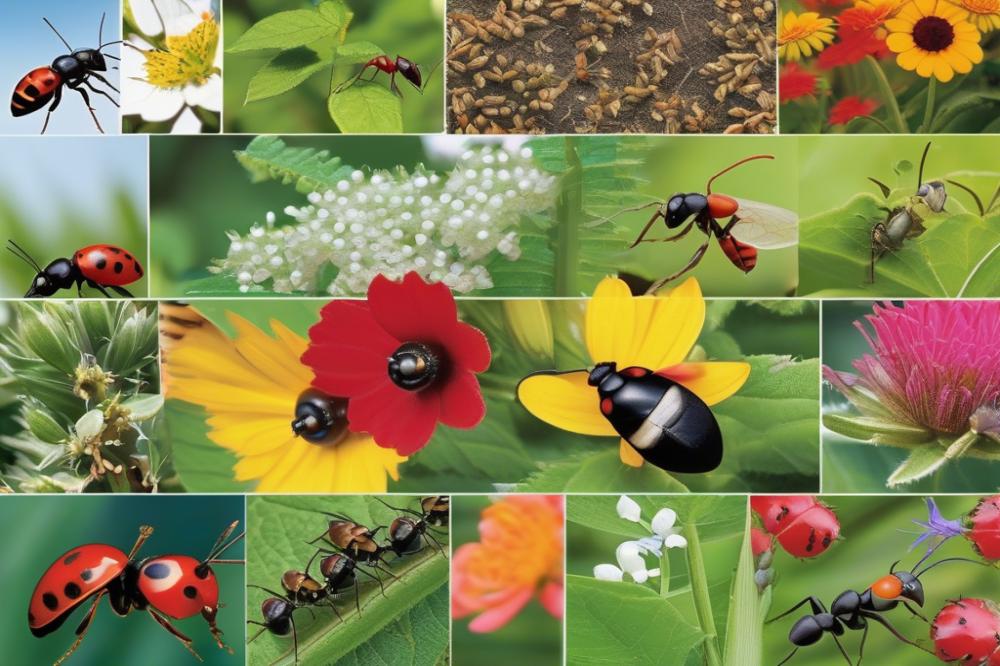

In gardens, you may encounter several common ant species. Carpenter ants, for instance, build nests in wood and can be destructive. Argentine ants often invade homes and gardens in search of food. Fire ants, known for their painful stings, can become a nuisance. Each species displays distinct behaviors and social structures, influencing how they interact with their environment.
Ants live in colonies, showcasing a complex social hierarchy. Queens produce offspring, while workers gather food and care for the young. Some ants are devoted foragers, scouting for sugary substances or protein. Their foraging patterns can vary significantly by species and time of day. Observing these behaviors may offer valuable insight for pest prevention.
Interactions with other pests can be quite interesting. Certain ant species tend to protect aphids from predators in exchange for honeydew, a sugary secretion. This relationship helps aphids thrive, potentially damaging plants. On the flip side, ants may also assist in controlling pests, such as caterpillars, by chasing them away. Understanding ant behavior can help you navigate these relationships in gardening.
Ants also play vital roles in promoting soil health. Their tunneling activities aerate the soil, improving drainage and nutrient circulation. This natural aeration process benefits plant roots, promoting healthier growth. Moreover, as ants break down organic matter, they contribute to nutrient cycling. A thriving ecosystem occurs when both ants and beneficial insects work together.
Implementing ant control strategies can help protect your plants. Using organic pest management techniques allows for safe and effective solutions. Natural remedies, like diatomaceous earth, can deter ants without harming beneficial insects. Regular garden maintenance ensures that your space remains less appealing to undesirable pests. These gardening tips will enable you to coexist with ants while minimizing their impact.
Ant Control Methods
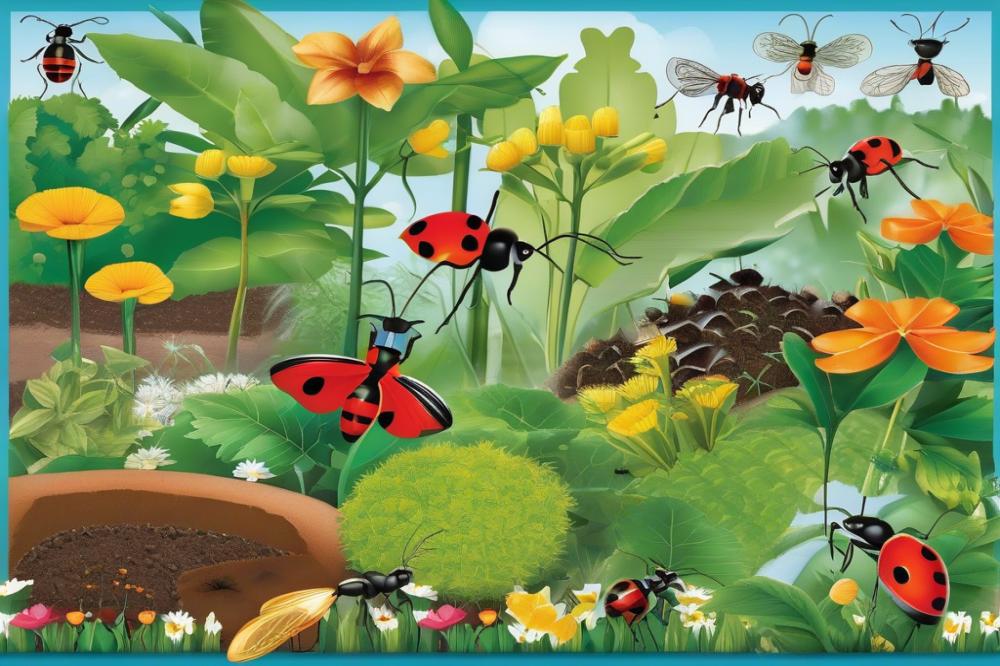

Managing ant colonies in garden beds requires understanding both chemical and organic pest management options. Some gardeners prefer chemical solutions that kill ants quickly. These products often contain strong ingredients that can harm the environment. Organic alternatives focus on natural remedies and usually promote soil health. Effective organic methods rely on plant-based solutions that carry fewer risks for beneficial insects.
It’s essential to think about pest prevention during garden maintenance. Keeping plants healthy can naturally discourage ants from invading. Strong plants thrive better, making it harder for pests to take hold. Implementing practices like crop rotation and companion planting can also be beneficial. These techniques not only protect plants but may even deter ants.
Understanding ant behavior is key to successful control. They often follow scent trails to food sources. That’s why eliminating food left in the garden is important. Using barriers is another effective strategy. Placing diatomaceous earth or cinnamon around garden beds creates a protective zone that ants tend to avoid.
For those seeking immediate results, many find effective ant traps on the market. Bait traps attract ants, letting them take poison back to their colonies. This method can lead to a quick reduction in their numbers. However, it’s crucial to balance the use of these products to maintain garden health. Keeping traps away from flowering plants helps protect beneficial insects that can aid in natural pest management.
Utilizing a combination of methods can yield the best results. Regular monitoring of garden beds can help catch ant problems early. Noticing changes in ant activity allows for timely responses. Whether choosing chemical or organic solutions, the goal remains clear: to maintain plant protection while promoting a healthy garden ecosystem.
Gardening Tips for Managing Ant Colonies
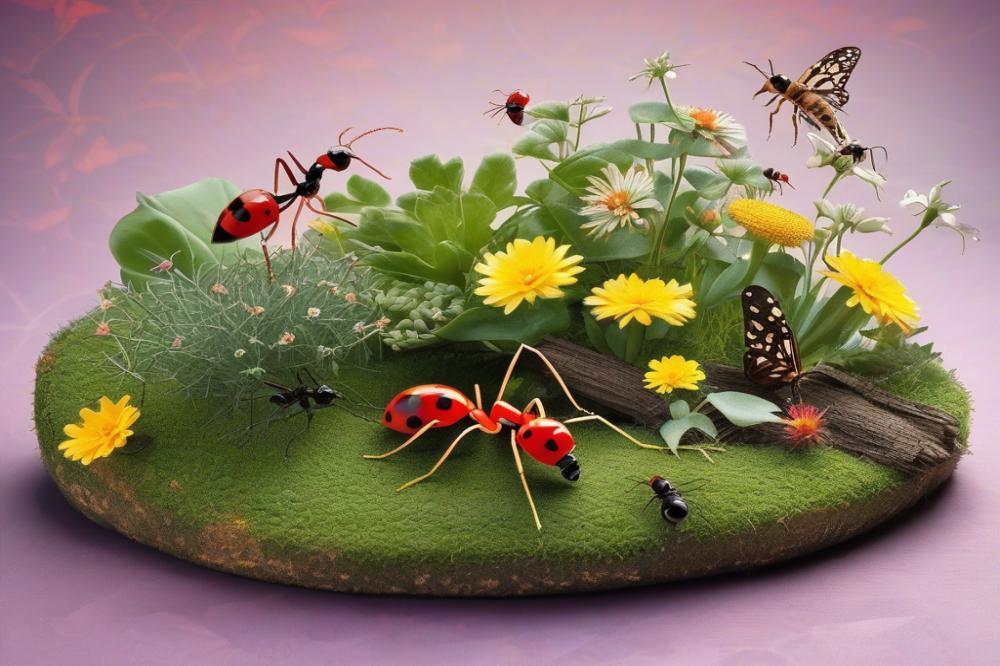

Prevention strategies are key to keeping your garden thrive and minimize ant colonies. Healthy soil is vital for plant growth. Enriching your soil improves its structure and nutrients. Using organic compost can boost soil health effectively. This doesn’t just benefit plants, it also discourages ant behavior.
Choosing pest-resistant plants can greatly reduce ant attraction. Some plants repel not just pests, but also ants. Varieties like marigolds and mint act as natural deterrents. Companion planting is another clever tactic. Pairing specific plants can confuse pests and create a balanced ecosystem. Some flowers and herbs even attract beneficial insects that aid in ant control.
When thinking of gardening tips, be mindful of what attracts ants. Keeping garden beds clean and free of debris is essential. Fallen fruits and vegetables can entice them. Thus, regularly removing food sources is necessary. Avoiding sugary mulch will also help in pest prevention. Try using wood chips or straw instead.
Regular maintenance practices play a significant role in keeping ants away. Watering your garden strategically reduces overly damp areas. Ants thrive in moist environments, as they seek out these spots for building colonies. Create barriers with ground covers or dense foliage to limit their movement. Natural remedies, such as sprinkling diatomaceous earth, can also deter ants and offer a sustainable solution.
Monitoring your garden is crucial. Observing for any signs of ant trails can help catch issues early. If detected, act quickly before they establish themselves. Take time to explore organic pest management methods that suit your garden’s needs. Remember, a proactive approach to plant protection will help maintain harmony in your garden.
Natural Remedies for Ant Management
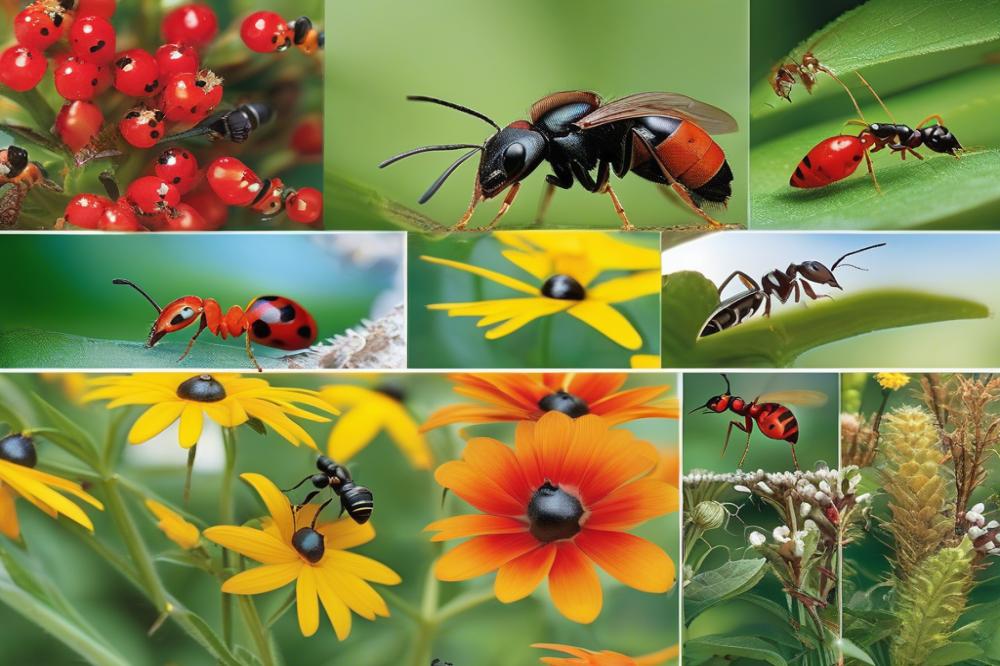

Managing ant colonies in garden beds can be challenging, but using natural remedies provides effective solutions. Essential oils like peppermint, tea tree, and citrus oils serve as excellent repellents. Just a few drops mixed with water can create a spray that deter ants from invading your plants. Many gardeners have found success with this simple mixture. Experimenting with different oils can lead to beneficial results.
Diatomaceous earth is another organic option. This natural powder comes from the fossilized remains of tiny water organisms. Sprinkling it around the garden creates a barrier. Ants have tough exoskeletons that can be damaged by the powder, ultimately leading to their demise. This method offers an eco-friendly way to combat unwanted pests while being safe for your soil health.
Consider adding beneficial insects to your garden. Ladybugs and lacewings, for example, are natural predators of small pests. When these helpful creatures are present, they can help control ant populations and reduce the need for chemical interventions. Observing ant behavior can provide insights into how these beneficial insects can fit into your gardening plans.
Applying natural pest control methods can safeguard your plants effectively. Many gardeners appreciate these organic solutions because they are safe for the environment and do not harm the ecosystem. Insecticidal soap can also prove beneficial. This product, derived from natural plant oils, suffocates ants on contact without impacting beneficial species if used correctly.
For ongoing pest prevention, maintaining a clean garden is vital. Removing food sources, such as dead plants or decaying fruits, reduces ant attraction. Regular garden maintenance helps preserve soil health and supports plant protection. Make it a habit to check for ant trails. Early detection allows for prompt action, keeping infestations to a minimum.
Monitoring and Maintaining Ant Populations
Effective management of ant colonies starts with understanding their activity in garden beds. Observing the visible signs of ants is essential. Look for trails of ants moving consistently between their nests and food sources. These trails often indicate an established colony nearby.
Indicators of infestations can vary. Damage to plants and soil disturbances are common signs. Ants can move soil around, which may affect plant health. If you notice wilting or dying plants, it might be linked to ant activity. In some cases, these insects protect aphids on plants, causing further damage.
Regular monitoring of your garden is vital for sustainable pest prevention. Check your beds frequently for signs of increased activity. Simple techniques can help; for instance, walking through your garden and examining base areas of plants might reveal nests. Additionally, lifting rocks or debris can uncover hidden colonies.
Gardening tips often include methods for maintaining soil health. Healthy soil can help resist ant infestations. Layering organic mulch can hinder ant movement and attract beneficial insects. These insects, like ladybugs and lacewings, contribute to natural pest control and support plant protection.
Understanding ant behavior can aid in developing non-invasive tactics. Recognizing their foraging patterns may help identify when to act. Using natural remedies, such as diatomaceous earth or essential oils, can deter ants without harming your plants. Incorporating these methods into your garden maintenance routine encourages a balanced ecosystem.
Implementing organic pest management strategies is crucial. In addition to monitoring, offering a diverse environment can attract predatory insects that target harmful pests. Cover crops and companion planting can enhance this diversity, making your garden less appealing to unwanted visitors while ensuring plant health.
Final Thoughts on Managing Ant Colonies
Maintaining a balance in your garden is essential. Managing ant colonies helps protect your plants while allowing beneficial insects to thrive. Ants can be both helpful and harmful. In small numbers, they aerate the soil and control other pests. However, large populations can damage your plants.
Consider what works best for your specific situation. Some gardening tips include using barriers or natural repellents. These methods can reduce ant activity without harming other insects you might need. Always observe your garden. You’ll notice which bugs help your plants grow and which may pose a problem.
Creating a healthy garden environment means nurturing all the parts of your ecosystem. Avoid harsh chemicals when possible. Natural solutions can keep your garden safe for both plants and wildlife. If you can control ants without disrupting their roles, you set the stage for a thriving garden.
In the end, it’s about balance. Respecting nature’s complexity while managing ant control allows you to enjoy your gardening journey. Build a space where plants and insects coexist peacefully. Your hard work will lead to a productive and vibrant garden that flourishes year after year.

